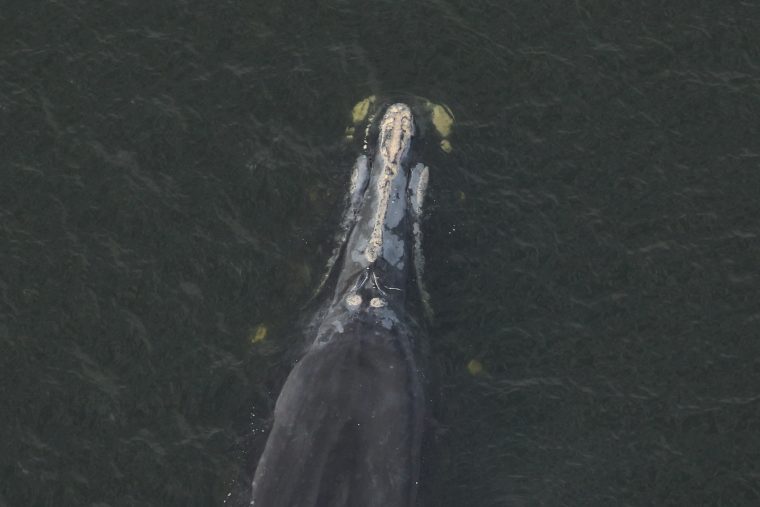Naming helps researchers recognize critically endangered whales on sight

BOSTON, MASS. (December 3, 2020) – Researchers have named 18 North Atlantic right whales this year, continuing a tradition that allows scientists in the field to quickly recognize the critically endangered individuals.
New England Aquarium researchers who manage the North Atlantic Right Whale Catalog—a photo identification database developed by the Aquarium for the North Atlantic Right Whale Consortium—organize sightings of individual whales by assigning them four-digit numbers. Once a year, whales that have particularly distinct features or a strong story connection to their history are nominated to receive names. Researchers and members of the public can propose names, which are then narrowed down and voted upon by right whale field team members in the Consortium.
“By giving these whales names based on their marking, we are able to recognize them in real-time from a boat or a plane. We see the distinctive heart-shape scar and immediately know it is Aphrodite, #1701, named after the goddess of love,” said Philip Hamilton, research scientist at the New England Aquarium who manages the Catalog.
This year’s “graduating class” was unveiled at the North Atlantic Right Whale Consortium annual meeting in late October. The Aquarium and Whale and Dolphin Conservation collaborated to create playful bios for the whales, which can be read here. Among the newly named whales is Snow Cone (Catalog #3560), a 15-year-old female who has a callosity (natural markings) on her head in the shape of the summertime treat. In a nod to her New England roots, Catalog #2791 has been named Fenway for the long stretch of callosity on the top of her head that looks like a baseball bat. Her bio reads, “The Boston Red Sox are my favorite team and they play at Fenway Park!” Appropriately, her favorite song is “Sweet Caroline” by Neil Diamond, an 8th inning favorite at the ballpark.
“While the main goal of naming right whales is to help researchers more easily identify them, it’s also a really valuable way for people to develop a connection with whales they wouldn’t otherwise come to know,” said Monica Pepe, conservation and education policy manager at Whale & Dolphin Conservation. “These fun bios give the public a glimpse into the world of whale research, and I’m so glad we get to share these treasured whales with everyone.”
For 40 years, the New England Aquarium’s Right Whale Research Program has extensively researched and gained a better understanding of critically endangered North Atlantic right whales using the photo identification catalog. Discovering the threats these whales face inspires the team to collaborate with fishermen on new techniques to reduce deadly entanglements in fishing gear, facilitate communication across the shipping industry to reduce vessel strikes, and work with lawmakers locally, nationally, and internationally to lobby for protections for the whales. The estimated population number for this species stands at just over 350 whales.
MEDIA CONTACT:
Pam Bechtold Snyder – psnyder@neaq.org, 617-686-5068
